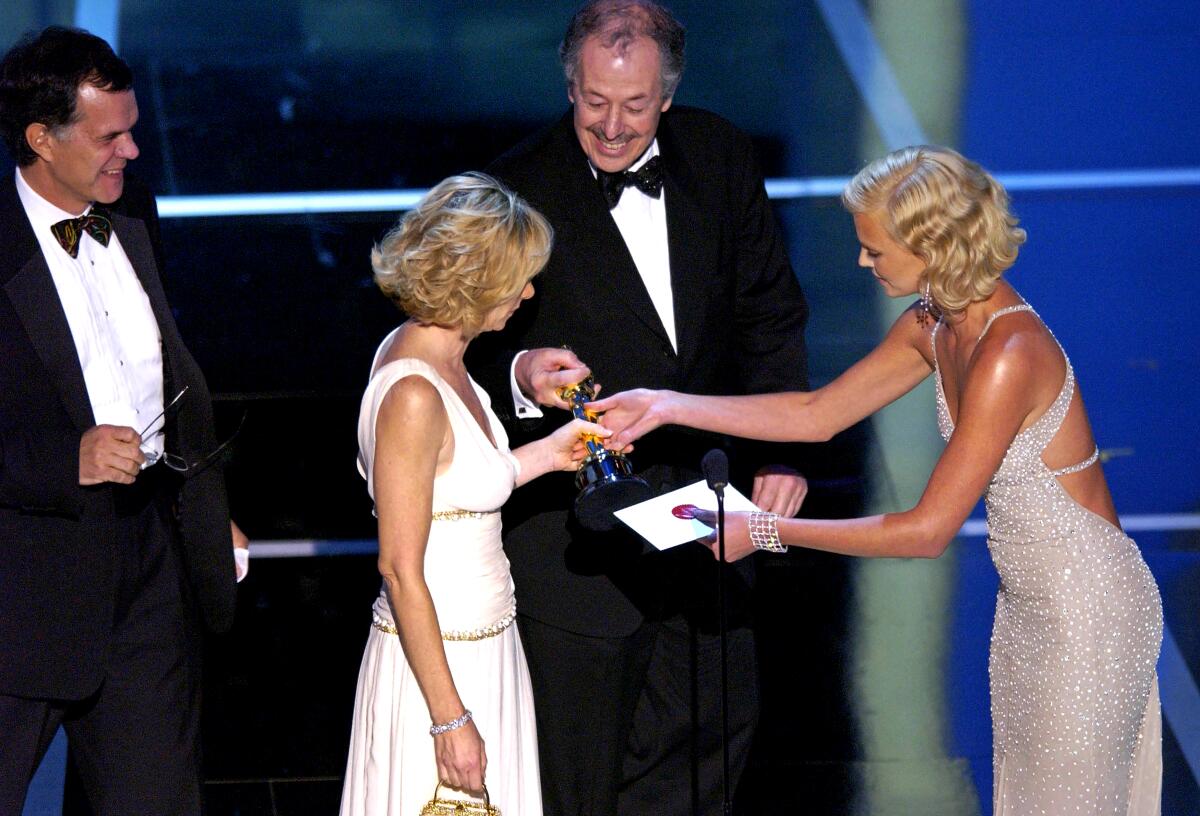Oscar rewind — 2004: Canada wins its first, and only, trophy for foreign language film

- Share via
Canada, Sweden, the Netherlands, the Czech Republic and Japan went head-to-head in a pitched battle in 2004 — but nobody got injured. That’s because those were the five nations vying for the foreign language film award (which since 2020 has been called the international feature film award), and gentle Canada came out on top.
The fact that “The Barbarian Invasions,” a French-language film submitted by our friends to the north, was directed and written by Denys Arcand probably didn’t hurt either. Arcand’s films had been nominated twice before in the category, for 1986’s “The Decline of the American Empire” and 1989’s “Jesus of Montreal.” He’d also been nominated for his original screenplay for “Barbarian,” the story of a dying man who connects one final time with his loved ones (and former loved ones).
But once Arcand was on stage accepting the award on behalf of Canada (the category rules mean the Oscar goes to the country, not the director) with his wife (and “Barbarians” producer) Denise Robert, plus fellow producer Daniel Louis, words failed him. Robert took over the remarks, quipping about a film that was already sweeping the evening’s prizes.
“We’re so thankful that ‘Lord of the Rings’ did not qualify in this category,” she noted, going on to thank their producers, the academy, and “the Canadian, French and Quebec governments for their support of the film industry.” She also gave a shoutout to Harvey Weinstein, as the film was distributed by Miramax in the United States, thanking him “for putting your heart behind this film and shining the light on this.”
After that, Arcand said simply, “My time’s up, as usual.”
Later that year, Robert told the Toronto Globe and Mail that it was a very stressful moment: “In a way we were very scared of disappointing the whole country. When you’re in best foreign, it’s not just your mum you’re disappointing, it’s your whole country. It’s a prize we want to win with everybody because this film is part of all of us.”
“Barbarians” remains the only Canadian film to have won in the category, which can have some quirky rules that keep many films out. Originally created in 1956 as the foreign language film award, the category requires that films be submitted by their country; that they can’t be predominantly in English (even if English is the official language of the country); but does not require a U.S. release (though they have to run for seven days consecutively in their country of origin) to be considered. Italy has won the award the most times at 14 with France close behind with 12, then comes Japan with five.
The other nominees told stories taking place during World War II, in feudal Japan and at a boarding school. Sweden’s “Evil” was directed by Mikael Håfström, and while Sweden would be nominated again the following year in the category, there have been no wins from the country since 1984 when “Fanny and Alexander” won.
Japan’s entry, “The Twilight Samurai,” was directed by Yoji Yamada. It may not have gone all the way, but just a few years later in 2009, “Departures” won the category, as did “Drive My Car” in 2022. Ben Sombogaart’s “Twin Sisters” was also nominated, and became the last time to date a film from the Netherlands has been nominated for an Oscar. The last time the country won was in 1998, with “Character.” And the Czech Republic fielded “Želary,” the last nomination the country has had, though it did win in 1997 with “Kolya.”
More to Read
Sign up for The Envelope
Get exclusive awards season news, in-depth interviews and columnist Glenn Whipp’s must-read analysis straight to your inbox.
You may occasionally receive promotional content from the Los Angeles Times.










